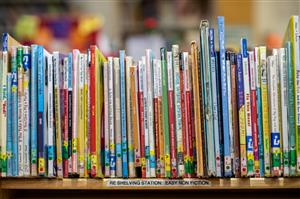 Manor is committed to instilling in its students a love of reading and writing. We are currently in our fifth year of implementing Reading and Writing Workshop in our K-5 classrooms. Developed through the Teachers College Reading and Writing Project from Columbia University, the workshop model is a research-based, authentic approach to teaching literacy. Students are taught "mini-lessons" based on the Common Core Standards and spend the bulk of their workshop time actively reading their "just right" books that they have self-selected. The teacher acts as a coach and confers with students or meets in small groups to guide their reading development.
Manor is committed to instilling in its students a love of reading and writing. We are currently in our fifth year of implementing Reading and Writing Workshop in our K-5 classrooms. Developed through the Teachers College Reading and Writing Project from Columbia University, the workshop model is a research-based, authentic approach to teaching literacy. Students are taught "mini-lessons" based on the Common Core Standards and spend the bulk of their workshop time actively reading their "just right" books that they have self-selected. The teacher acts as a coach and confers with students or meets in small groups to guide their reading development.
Along with reading workshop, students receive instruction in phonics and word work. Our curriculum includes Fundations in grades K-3 and Words Their Way in grades 4-5.
Reading Workshop in Action...
Focus: Readers’ Workshop in First Grade
The classroom is quiet and the children are focused on their daily work of reading. Several children are nestled in a corner with “Just Right” books perched in their tiny hands. Some children have post-it notes sticking out of their books where they decided to make a connection, identify a word they don’t know, make a prediction, or just comment on a character. Another group is quietly discussing a book they are reading together in a book club format. At first, the teacher is difficult to find since she is either knelt down in a 1-1 conference with a child about his or her reading or sitting at a u-shaped table with a group of students focused on a specific strategy through a guided reading lesson.
Just before this, the teacher began the workshop with a mini-lesson to set the stage for that day’s work on reading. She may have used a big book to highlight a specific phonics pattern or to build fluency. She may have focused on a comprehension strategy to foster the students’ understanding. Typically, a teacher chooses the mini-lesson based on her daily, on-going assessments of the students' needs and the California Common Core State Standards. The workshop approach is designed to meet students where they are and push them forward. In any classroom, there is a range of abilities and skill levels. It is the role of the teacher to “differentiate” the instruction for each child. That is why you will see teachers working with small groups or individual students during a readers’ workshop.
Toward the end of the workshop, the teacher calls the students to the rug in a circle. The teacher asks, “What strategy did you use today while you were reading your “Just Right” Books? Hands shoot up and the students proudly share their strategies for that day.